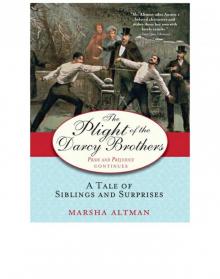- Home
- Marsha Altman
The Plight of the Darcy Brothers Page 17
The Plight of the Darcy Brothers Read online
Page 17
Darcy ran across the deck, which was not excessively long, and hoisted his brother up again so he could lean over the side. Brian Maddox remained in place and bowed to Elizabeth approaching him. “Mrs. Darcy.”
“Mr. Maddox.” She curtseyed a little unsteadily, considering the rocking of the boat. “Whatever are we doing to that poor monk?”
“What is that poor monk doing to Mr. Darcy? He hasn't had a moment's peace for a few hours now,” Brian remarked with a smile. “Brotherly affection is unconditional. At least, when one is not in competition with the other. Usually it requires a great age difference.”
“You are a prime example of that, if I may say, Mr. Maddox,” Elizabeth said.
“My very life hinges on my own stupidity and Danny's intelligence. I won't deny it,” he said. Brian Maddox was known for a former life of gambling, ruination, and being poor in a fight. “I'm very happy to hear that he's doing so well. At least now he can support Caroline on his own, which must be a great load off his mind. Me, I could hardly have the courage to bring myself to such a high-class woman. No offense meant to a sister, of course.”
“It is hard to deviate from the truth,” she said. “Though I cannot say I have seen much of them since they were married, as I am so rarely in Town. But, to be honest, there was some surprise in the family when we discovered she was considering a man without a great inheritance.”
“Or a title. As long as he doesn't ruin it, he'll have knighthood eventually. But Danny is very good at being diplomatic to his patients.”
“So that's it?” Caroline said. “You would have your own head on a spike and me a widow because of some prostitute?”
“No! Of course not! I mean, if it comes to that—,” but honestly, Daniel Maddox didn't know what it would come to. He didn't know what he could say to the prince that would possibly persuade him or keep himself from being fired. “But—she is a woman in need. What am I supposed to do?”
“She is a whore, Daniel.”
“That does not change her physical composition. Or the fact that she is carrying a royal child.”
“So she says. Do you believe her?”
He scratched his head. “I don't know… mostly. Look, I have a moral obligation—”
“You have no such obligation. She is exploiting you—”
“So she is! What is she to do? She is desperate! Do you think women become prostitutes because they like letting men use them? Do you think they don't get horrible diseases that they eventually die of? Or get with child and are possibly killed off when they go to the married man who impregnated them? Do you think most of them have any choice?”
“Don't sermonize to me!”
“I am not sermonizing! I am not repeating something from a passage I read in the Bible! I'm saying this because I've seen the life, and I have a chance to help this poor, mad girl with a future child—and for some reason, I am very receptive to the pleas of expecting women at the moment.”
He softened his tone, kneeling before his wife and taking her hands. “I am serious, Caroline. If you wish me to turn her away, I will. But I don't wish to. You will never have to see her again, but I want to go to the prince and tell him what damage he has wreaked, though putting it much more politely than that. But not without your consent.” He touched her cheek. “I will do as you command.”
Caroline seemed to be softening. Or, she seemed to be beginning to cry, either one. “I will not be a widow over this. It is not fair.”
“I would not make you a widow. Or, I try my best, despite my profession.” He embraced her, which was getting to be a more difficult prospect at this point. “Say the word, and Lilly's request will be forgotten.”
“Will you forget it?”
He sighed. “No. But it will not be spoken of again.”
“You're just like Darcy,” she said. “Always the hero. Why can't you just be stupidly naïve like Charles? Or asleep like Mr. Hurst when someone rings at the door?”
“Charles is not naïve. He just appears to be. In—some respects.”
“I know that!” she shouted, pounding him limply on the chest. “I would ask you why you care about this woman so much, but I know you're only going to give me the most noble of answers and mean it—and then I must consent or be a horrible woman for not doing so.”
“You would never be a horrible woman.”
“Despite rumors otherwise. There was a reason I was unmarried until I was one and thirty.”
“Well, by the same logic, since I was unmarried until one and thirty, so I must be one horrible woman as well. Though in my case, it makes sense.”
This was enough to bring laughter out of Caroline, which stopped abruptly as she put her hand over her stomach.
“Are you all right?”
“The baby just kicked,” she said, and Maddox pressed his hand against her sizable belly. “You can't tell it, of course.”
“The gender? No. That must be a surprise saved for the end.” He kissed her. “I love you.”
“What good are you as a doctor if you can't even tell the gender of your own child?” she said, her mood noticeably altered from just a few moments before. “Just don't you dare make me a widow.”
“Never.”
“And try not to lose your commission as well.”
“Then it is agreed?”
Caroline had no response but to hug him tighter. He took this as an affirmative.
The Darcys rested a day at a small port town that could have been quite pleasant, if Grégoire's health hadn't become a serious risk. When they got him on shore, he was quite weak, but he recovered quickly with food, drink, and soil beneath him. Maddox, who knew Italian as well, hired a carriage for them and a horse for himself, and guided them until they were nearly in view of the ancient city of Rome itself.
“Here we must part ways for my own safety,” Maddox said. “If you need me, send for me at an inn named Bella Notte to the east. I would point out that I am considered an excellent courier—must be all those years of running away from people that put me into such shape.”
And with that, he took his horse in another direction, going north.
To Grégoire's great delight, he did get to make his proper walk to Rome, if not all the way. The path they had taken was so bumpy that the carriage had to proceed at a slow pace, and Grégoire was enough recovered to walk the last remaining miles as the Holy City appeared in the distance. At the sight of it, he dropped to his knees and bowed.
“His ardor may be decreased when he sees the reason we travel here,” Darcy said.
“You are just grumpy because you know you'll never talk him out of monasticism.”
He decided he was willing to give her that. “Perhaps.”
And so the Darcys went down the hill and into Rome in the early summer of 1807.
Rome was unlike any other city. It had been built on mystic origins instead of a trading port, as London had been. Rome had seated the Roman Republic and then the Roman Empire for a thousand years, and had become the seat of the church that ruled all of Christendom before Martin Luther and John Calvin and Britain's own John Knox. Rome was full of hills overlooking the Tiber, covered with abandoned ruins and ones reused to build newer structures, so that even with all his studies on Roman history, Darcy could not point out precisely the origins of every place they found on the road. Nothing looked new, nor precisely old, and they saw as many barons and wealthy merchants as tonsured priests and nuns.
When the carriage became rather useless, they emerged into the streets themselves, which were hot and buggy but not unbearable. Darcy could not seem to ignore his brother's pleas to see St. Peter's. Darcy would have excused himself from this business, but Elizabeth expressed a more pedestrian interest in the seat of the Papery, and he wished to see it with her if she was to go.
Hands together—something clearly appropriate here, and a luxury they enjoyed—the Darcys watched Grégoire ascend and kiss each step leading to the courtyard of St. Peter, with its marble st
atues of the church fathers and Roman architectural façade.
“You've given him a great gift, bringing him here,” Elizabeth whispered to Darcy.
“Or a favor. In which case, he would perhaps be kind enough to repay me by visiting Pemberley before returning to Mont Claire.”
“Scheming, as usual.”
“For everyone's good, of course,” he said.
They had no words, at first, to fully describe the cathedral they entered. It was massive, and although they visited between masses, it was still rather crowded with visitors to see the wooden throne of St. Peter. And what a throne it was! It was only a wooden chair, too high in the air for anyone to sit on it now, but it had four bronze pillars surrounding it. All of the literature the Darcys had read on the wealth of the Papacy was clearly not unfounded. Grégoire bowed to the floor and was received by an attending priest, and there was some amount of groveling and blessing before Darcy could approach his brother. “We must find suitable lodgings for tonight, eventually, and your skills are needed in this. After the task is done, you can return, but I would ask this small favor of you.”
“Of course. In fact, let us go now, so that I can return for Compline. He bowed to the priest, and they hurried out of the basilica.
Between Darcy's natural abilities to assess where the wealthy situated themselves and Grégoire's translation, they were able to rent a cramped, but suitable apartment that would do for the moment. Darcy kept his brother long enough only to eat something and translate Darcy's letter of inquiry as to the location of Mr. Mastai, if he was in the city at all.
With that sent, they separated, and Grégoire rushed to Compline, his exuberance carrying him all the way there. The Darcys themselves found themselves hot and exhausted, and were happy to retire. The building was centuries old and a bit drafty, and that was its saving grace.
“Better accommodations will be found,” Darcy assured Elizabeth, though it was mainly himself that needed assuring. “When our business is done here, perhaps we will retire to one of those famous villas while we wait for an answer.”
“Do you have a plan for asking the question?”
“Oh, yes,” he said.
“Does it involve you just walking in, speaking your mind, and maybe throttling a boy younger than your brother until he agrees to a settlement?”
He smiled. “Perhaps it is not the most cunning of plans.”
“Mary is my sister, and I have some questions for Mr. Mastai myself, if you don't mind. In fact, that may aid us, for if Miss Talbot is correct, Mr. Mastai may have some affection for Mary or even love her. Misplaced in his actions, but still.”
“Useful knowledge to have in bargaining.”
“It is not all about bargaining. Emotions are involved, Darcy. You remember emotions? Ones you feel about people you haven't even met or don't even like, but are afraid to express?”
“I am not afraid.”
“Then you are just exceedingly shy.”
“I am not shy.”
“Now you are just being stubborn.”
“Have you ever known me to be anything else?”
Elizabeth could not reply that she had.
They set out after Grégoire returned from morning Mass. It was hot but not unbearable, and even though Elizabeth had a brimmed hat, Darcy bought her a parasol, as well as a wooden cross necklace for his brother, to which, surprisingly, the monk did not object. The seller said that His Holiness had blessed the necklace, and as much as Darcy doubted that, he said nothing.
Rome was the Holy City, but it was a modern city as well, if a bit confused in its orientation, having never been planned out properly to be the size that it was. They soon found the residential streets quite winding and disorienting. Grégoire was invaluable, although he was horrified that Darcy was willing to put ducats in the hand of any man who seemed, through translation, to be reluctant to give directions.
They were misled and probably lied to, but eventually they found someone, a woman hanging out clothing to dry, who said she had once rented an apartment from the family, but that the family had a bigger one down the hill, and she knew little else. Perhaps the fact that this British couple was traveling with a young monk of only the most humble appearance endeared them to her enough to tell them that without outright bribery.
“Grazie,” Darcy said, which was basically the extent of his Italian. “I did pronounce that right?”
“Yes,” Grégoire said, in his own bizarrely accented English. “Down here, she said. All the way to the end.”
Fortunately the route was downhill. They descended until at last they reached an old apartment house with a new false Roman façade. Darcy rapped harshly on the door with his walking stick, making no pretense of ringing the bell.
A dark woman, who was obviously a maid, opened the door, and Grégoire bowed to her, keeping his eyes low. “Scusilo. È questa il Mastai residenza?” (“Excuse me. Is this the Mastai residence?”)
“Sì.” She cast a look of suspicion at the well-dressed foreigners behind the monk.
“We are looking for Giovanni Mastai,” Darcy broke in, figuring the name was enough. It seemed to be. Despite his English, her head snapped up at the name.
“Tell her it's urgent,” Darcy urged Grégoire.
“Scusili. È un aspetto urgente.” (“Excuse us. It is an urgent matter.”)
“Il padrone non è domestico.”
“She said the master isn't at home,” Grégoire translated.
“Give her this and ask if he will see us,” Elizabeth said, pulling from her pocket a rosary with red beads. “Please.”
Grégoire took the beads from her and held them up to the maid. She nearly grabbed them from his hand. “Scusilo,” and then she slammed the door shut.
“Very clever,” Darcy said to his wife. “I knew I brought you along for a reason.”
“Brought me along? She's my sister!”
He was unwilling to put up an argument, however pleasing, in the heat. Since the maid did not instantaneously reappear, they seated themselves in the little garden across the street, where a fallen imperial column made for an excellent bench and a gnarled tree created some shade. Aside from the buzzing of insects, the area was remarkably quiet, away from the bustle of the town's center. Or perhaps the Romans had the sensibility to retire in the midday heat.
Unfortunately for Darcy, he had insisted on his usual attire, though his cravat was not as complex when he tied it himself. Elizabeth had chastised him, but to no avail. Mr. Darcy was a proper English gentleman and would only be seen as one, especially on a mission of such monumental gentlemanly importance. That did not, however, mean he wasn't ruining his wool clothing with sweat.
“Dear, you're going to be ill,” Elizabeth told him.
“I suppose it's my turn,” he said. “You've both had a go at it.”
At last, the door opened, and the maid gestured for them to enter. They were ushered into a cramped but beautiful two-story apartment. It was full of artifacts, practically crammed with them, in fact, like an unsorted collection. Every wall was lined with books. Where there weren't proper bookcases, piles of books were stacked neatly against the wall. The maid, still the only person they had seen, gestured for them to be seated on a couch in what was apparently a sitting room, if a sitting room more resembled a library, but then again, so did the hallways.
On their left was an entrance to the balcony overlooking the hills of Rome, and it provided some breeze. They were not given refreshments. In fact, they were left quite alone and wondered after a time if they were ever to be introduced to anybody, much less the right person. But then their long pilgrimage came to an abrupt end. A man—no, a very young man—entered, looking terrified with his arms folded behind his back. Around his neck was his rosary, the one Elizabeth had handed over. He was dressed simply in a seminary uniform, but without the priestly collar.
“Excuse my delay. I believe you are seeking me.” He bowed, and they did the same. His English was fluent,
but highly accented with the traditional Italian leanings. “I am Giovanni Mastai.”
THE WOULD-BE PRIEST
“IF YOU WILL EXCUSE the question,” Giovanni said, “I was not told who you were, though I can only imagine why you are here.”
“I am Mrs. Elizabeth Darcy,” Elizabeth broke in. “And this is my husband, Mr. Darcy. My maiden name is Bennet.”
“Ah,” he said. “Mary's sister.”
“So you know why we sought you,” Mr. Darcy said in a much deeper and more obviously threatening tone. “Or have some imagination on that subject. This is Brother Grégoire, who is Mary's brother-in-law.”
Grégoire bowed again.
“Then please allow me to get you some refreshments—”
But he would not have his escape. Darcy grabbed him by the collar as he tried to make his hasty exit. “While I would very much enjoy refreshments, we have not come this far to chat idly over tea, Mr. Mastai. Or is it Father Mastai now?”
“Darcy!” Elizabeth said, and would not give up her cold stare until Darcy released the boy, who gasped, once free. “We will be civil. Though, if you would, please answer the question, sir.”
“It is Mr. Mastai. I have not been ordained, though it is only a matter of time.” But surprisingly, there was confidence in his voice. Not only was he terrified, but he had a humble tone. “I was simply told Englishmen like to be very… what is the word, quiet and proper?”
“We are not in England,” Darcy replied. “And so we must be Italians and get right to the point, I suppose. You know the only proper course of action in this situation, however delayed it would now be.”
Giovanni swallowed. Elizabeth almost pitied him. “I—I am aware of your country's standards, but you must also be equally aware that I cannot do this. I have always been intended for the church, almost since I was old enough to walk—”
“That would make you quite the model of celibacy, wouldn't it?” Darcy said. “That would be expected of you.”

 The Knights of Derbyshire
The Knights of Derbyshire Other Tales: Stories from The Ballad of Gregoire Darcy
Other Tales: Stories from The Ballad of Gregoire Darcy The Ballad of Gregoire Darcy
The Ballad of Gregoire Darcy Mr. Darcy's Great Escape
Mr. Darcy's Great Escape The Darcys and the Bingleys
The Darcys and the Bingleys The Plight of the Darcy Brothers
The Plight of the Darcy Brothers The Road to Pemberley
The Road to Pemberley